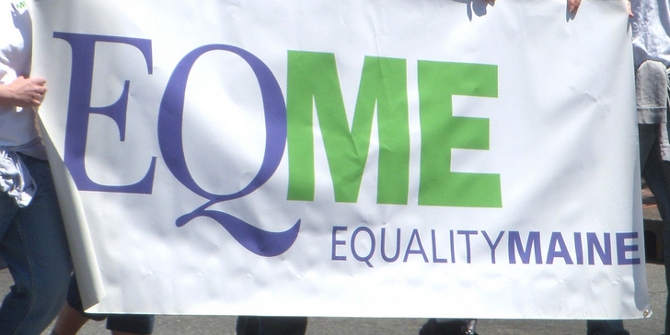
 A large amount of legislating and policymaking that affects Americans is produced by the states rather than the federal government. Often states’ policy choices reflect the ideology of its legislators. In new research, Stefani Langehennig, Joseph Zamadics and Jennifer Wolak investigate whether people’s approval of their state legislature depends on the political lean of the state government’s policies. They find that voters do care: as a state’s policies become more liberal, then liberals’ approval of the legislature increases, while conservatives’ decreases, an effect that is reinforced when people have a higher level of knowledge about their state’s politics.
A large amount of legislating and policymaking that affects Americans is produced by the states rather than the federal government. Often states’ policy choices reflect the ideology of its legislators. In new research, Stefani Langehennig, Joseph Zamadics and Jennifer Wolak investigate whether people’s approval of their state legislature depends on the political lean of the state government’s policies. They find that voters do care: as a state’s policies become more liberal, then liberals’ approval of the legislature increases, while conservatives’ decreases, an effect that is reinforced when people have a higher level of knowledge about their state’s politics.
State governments are taking an increasingly active role in policymaking, legislating in areas that affect Americans’ day to day lives – from education to infrastructure to environmental issues to health and human services.
Are the policy choices made by the states consequential for what people think of their state government? In new research, we consider whether people’s approval of their state legislature reflects their satisfaction with the policy outputs of state government. Using survey data, we explore whether people give warmer evaluations of their state legislature when they live in states that produce policy outcomes that are better aligned with their political preferences.
There are reasons to suspect that people are not responsive to the ideological tenor of policy outcomes in their state. Even though most people live closer to their state capital than to Washington DC, state politics often seems attract less attention than national political debates. As the number of reporters in state capitals declines, people may not be following the policy debates within state governments very closely. If true, people may lack the information needed to hold state legislatures accountable for the policies they produce.
We challenge this notion, and propose that people are better equipped to hold state legislatures accountable than many have suspected. Even though national politics attracts more media coverage than state politics, people are nearly as likely to express interest in following state politics as they are to say the same about the federal government. Knowledge of state politics is not much lower than knowledge of national politics, as people are only slightly less likely to know which party controls the state legislature as to know which party controls Congress. In a time of increased party polarization, the distinctiveness of state legislative parties likely helps people recognize the ideological climate of politics in their state.
We believe that people incorporate the political lean of state policy outcomes into their evaluations of their state legislature. We hypothesize that liberals will be more likely to approve of their state legislature as the relative liberalism of state policy outcomes increases, while conservatives will reveal higher approval when they reside in states where policy outcomes are right-leaning.
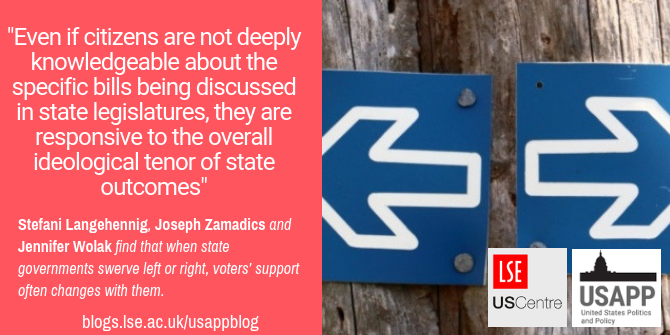
“733252” by pxhere is CC 0 Public Domain
We test this using responses to the 2014 Cooperative Congressional Election Study. We explore how approval of the state legislature varies as a function of the liberalism of state policy outcomes and the ideological leanings of survey respondents.
We find that the liberalism of state policy outcomes predicts state legislative approval, conditional on people’s ideological leanings. Consider a state with particularly conservative state policy outcomes. As Figure 1 shows, our model predicts that a person who self-identifies as very conservative will have a 70 percent likelihood of approving of their state legislature, while someone who identifies as very liberal will have only a 21 percent predicted probability of approving of their state legislature. As the liberalism of state policy outcomes increases, approval ratings drop among conservatives and increase among liberals. For a state at the highest level of policy liberalism, a strong conservative has only a 25 percent probability of approving of the state legislature, while a strong liberal has a 68 percent probability of approving of the legislature.
Figure 1 – Approval of state legislature and state policy ideology
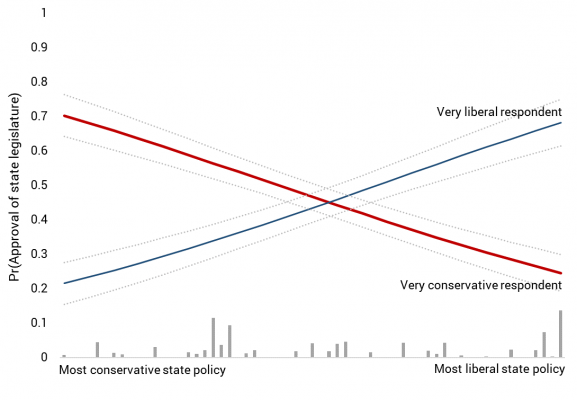
People incorporate the ideological tenor of state policy outcomes into their assessments of the performance of state legislatures, effects that are robust to controls for the partisan composition of the state legislature. We also find that political knowledge strengthens this relationship. We see the greatest responsiveness to state policy outcomes among those with the highest levels of knowledge of state politics, while those at low levels of knowledge do not seem to weigh policy outcomes in their ratings of their state legislature (Figure 2).
Figure 2 – State politics, ideology and state policy liberalism
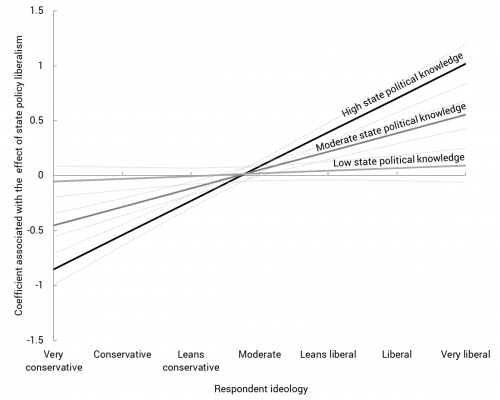
We also draw on panel data from the 2012-2014 Cooperative Congressional Election Study to explore how people’s approval of their state legislature changes as the liberalism of state policy outcomes shifts over time.
For those who live in a state where policy outcomes move to the left between 2012 and 2014, we find that liberals who live there tend to offer warmer evaluations of the state legislature in the second survey than the first, while conservatives offer increasingly unfavorable evaluations. As Figure 3 illustrates, the opposite holds true in places where policy outcomes shift in a conservative direction from 2012 to 2014. In these contexts, we find liberals offering increasingly negative ratings of their state legislature, while conservatives offer warmer ratings than they did two years prior. Changes in state policy outcomes are tied to changes in how people evaluate their state legislature.
Figure 3 – Ideology and state policy liberalism
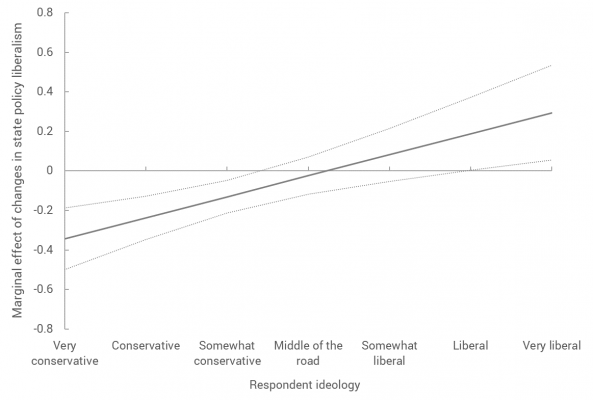
Our findings show that voters in the states are responsive to the policy choices being made in state capitals. Even if citizens are not deeply knowledgeable about the specific bills being discussed in state legislatures, they are responsive to the overall ideological tenor of state outcomes. When state legislatures work to move policy outcomes to the left or to the right, citizens respond to these changes. State elected officials have influence over how people perceive state legislatures. In passing legislation that appeals to as many state constituents as possible, state legislatures can increase their popularity among voters.
- This article is based on the paper ‘State Policy Outcomes and State Legislative Approval‘ in Political Research Quarterly.
Please read our comments policy before commenting.
Note: This article gives the views of the author, and not the position of USAPP – American Politics and Policy, nor the London School of Economics.
Shortened URL for this post: http://bit.ly/32gahO5
About the author
 Stefani Langehennig – University of Colorado at Boulder
Stefani Langehennig – University of Colorado at Boulder
Stefani Langehennig is a Data Scientist/Product Developer at Decoded in London. She earned her Ph.D. in political science from the University of Colorado at Boulder in 2019.
 Joseph Zamadics – University of Colorado at Boulder
Joseph Zamadics – University of Colorado at Boulder
Joseph Zamadics earned his Ph.D. in political science from the University of Colorado in 2019. His dissertation research focused on issue salience in lawmaking in the states. He works as a data scientist at Morning Consult.
Jennifer Wolak – University of Colorado at Boulder
Jennifer Wolak is an Associate Professor at the University of Colorado at Boulder. Her research interests include state politics, political psychology, and public opinion.





